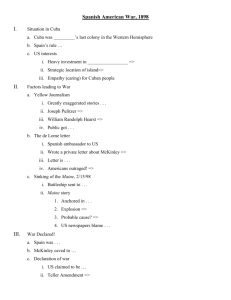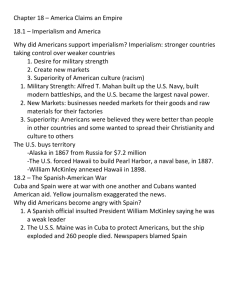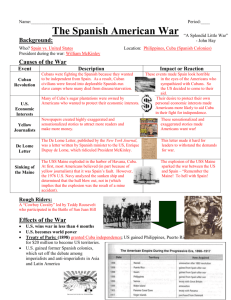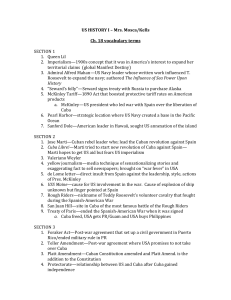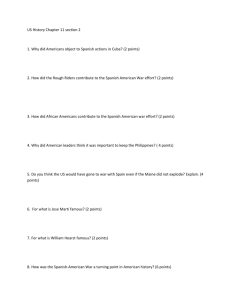American Imperialism - McEachern High School
advertisement
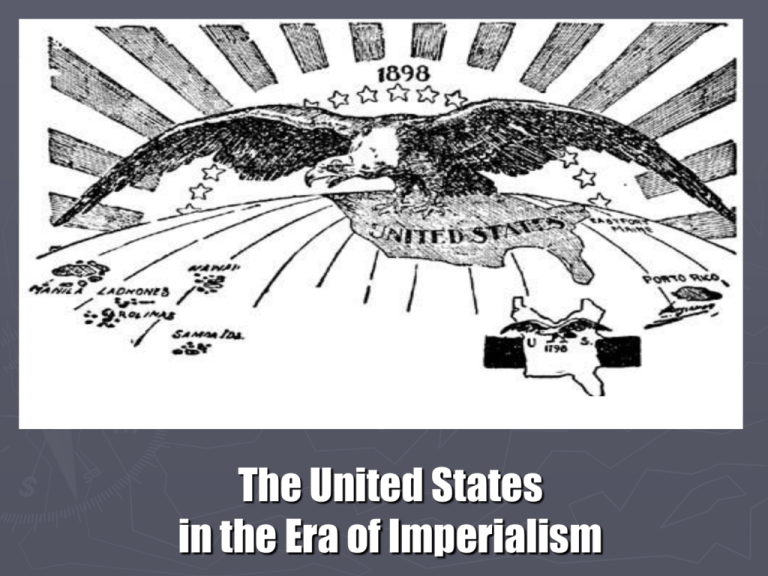
The United States in the Era of Imperialism Imperialism --The economic, political, cultural or military domination of weak nations by strong nations. AMERICAN IMPERIALISM • America was founded by risk-takers and explorers… • And the first 150 years of our history… • Was a time of relentless expansion. • However, this is not seen as “Imperialism”… • Because the conquered territory was believed to be the “natural property” of United States. European Imperialism • European imperialism • • • • • began around the time of the voyages of Christopher Columbus… And by 1900, the European “Empires”— Great Britain, France, Germany, Holland, etc., Were in a competition to conquer and occupy territory around the world… With the PRIMARY goal of capturing much needed raw materials… To fuel their participation in the Industrial Revolution. Humanitarian Impulses? Of course, the European Empires didn’t openly ADMIT that their efforts amounted to simple thievery. European imperialists argued that they were bringing LIGHT to DARKNESS… European medicine, law, government… And, especially, RELIGION… Were, they argued, so SUPERIOR… That the Europeans were actually doing conquered nations a FAVOR. This RACIST viewpoint was referred to as “The White Man’s Burden.” American Begins to Expand • The US’ first step towards • • • • • • • international expansion came with a PURCHASE… When, in 1867, Secretary of State William Seward bought Alaska from Russia for $7.2 million. About a penny/acre. The purchase was widely RIDICULED at the time… But it nearly DOUBLED the size of the United States… And added a territory of nearly LIMITLESS wealth— GOLD, SILVER, COAL, OIL, LUMBER are all ABUNDANT in Alaska— And the deal is now seen to have been as STROKE of GENIUS. Manifest Destiny Sputters Out By the end of the 19th century, Manifest Destiny had been achieved… There was nowhere else to go… And influential politicians and public philosophers began to argue… That the AMERICAN SPIRIT went hand-in-hand with EXPLORATION and EXPANSION— And that our unique culture would DIE… If the nation stopped expanding. So our political and military leaders began looking for OTHER regions into which the US could expand. Economic Expansion • Spiritual fulfillment was not the only • • • • • • • • argument for American expansion… The industrial revolution had dramatically increased PRODUCTIVITY… And factories were producing MUCH MORE than American could buy… Which led to huge surpluses… And regular economic disasters. What was a solution to this problem? Many political and economic leaders argued that America should… CONQUER territory abroad… In order to establish new markets for the sale of American products. • • • • • • • • • • The MONROE DOCTRINE had ensured that by the second half of the 19th century… The US was the SUPREME POWER in the Western Hemisphere. Consequently, in seeking to conquer new markets… America looked SOUTH… And became heavily involved in the political and economic systems of scores of Latin American nations: Panama, Argentina, Uruguay, Nicaragua, Costa Rica, the Dominican Republic, Haiti, Guatemala, etc., etc., etc. Some of this involvement was BENEFICIAL: Hospitals and schools were constructed with American dollars… Some of it was NOT BENEFICIAL… Unfriendly leaders were sometimes overthrown or assassinated by the USA. Latin America Cuba ► ► ► ► ► ► ► ► ► The island of Cuba—90 miles off the coast of Florida— Had been claimed as a Spanish colony in 1492. 400 years later, Cuba was still under Spanish control… And a large segment of the Cuban population was determined to become independent. In 1892, a Cuban revolutionary named Jose Marti declared a “War of Liberation” against Cuba’s Spanish rulers. The Spanish government responded to this revolutionary activity… With the utmost BRUTALITY— Torture, random imprisonment, summary execution— And the Cuban people began to PLEAD with the American government for assistance. American Interests in Cuba • The American public was generally not interested in helping the Cuban people… • However, American businesses owned tens of millions of dollars worth of property on the island… • And when American property came under threat in the fighting… • RICH Americans began to call for American intervention. Yellow Journalism Although rich investors had started to take interest in a possible US intervention in Cuba… Average Americans were still opposed. How could they be persuaded? The Cuban Revolution coincided with a new practice called “yellow journalism”… Wherein newspapers took minor stories… And made them SENSATIONAL… With splashy headlines and graphic pictures… Why? To sell more newspapers. WAR is good for the media industry. The result was that average Americans began to be slowly CONVINCED that an INVERVENTION in Cuba was NECESSARY. The Maine Incident • Bowing to public pressure, • • • • • • President McKinley sent the USS Maine to Havana… In order to “protect American interests” in Cuba. Spain was unhappy with this development, but reluctantly agreed… And on February 15, 1898, the Maine exploded… Killing 258 American sailors. Americans were OUTRAGED… And the American news media pinned the blame on SPANISH SABOTAGE. War is Declared • Upon the destruction of the Maine, McKinley sent Spain a list of demands… • They included: 1. Compensation for the Maine….and… 2. Cuban independence. • McKinley also called for a buildup of the US Military… • And Spain responded by declaring WAR on the US in April of 1898. The Spanish-American War • By August of 1898… • The US had destroyed the entire Spanish Navy… • And had won every major land battle. • After a final defeat in Puerto Rico, the Spanish Empire requested a peace treaty. The Treaty of Paris, 1898 • Spain recognized Cuba’s • • • • • • • independence... The US paid Spain $20 million… In return, Spain gave up the Philippines, Puerto Rico & Guam… These nations became “unincorporated” US territories… Meaning that their residents could not become US citizens. This was also the end of Spain as an imperial power. About 400 Americans died in battle… Many more died from food poisoning and poor medical treatment. ► ► ► ► ► ► ► After the war, the Filipinos expected to be granted independence… But the US was determined that they remain American property… And in 1899, Filipino freedom fighters issued a “declaration of independence” against Imperial America. This led to the “dirty war” in the Philippines— 4,200 Americans were killed… 16,000 rebels and 200,000 Filipino citizens were also killed. The Philippines did not gain complete independence until 1946. War in the Philippines Interrogation technique of the Philippine-American War Cuba After the war, Cuba was granted independence, but was forced to submit to US oversight… ► Later, Cuba became a playground for the kingpins of American organized crime— ► And Americans who wished to… ► Gamble… ► Visit with prostitutes… ► Or drink cheap liquor (especially during Prohibition)… ► Traveled to Cuba to do so. ► Puerto Rico In 1917, Puerto Ricans were granted American citizenship… And today, Puerto Rico operates in ALMOST the same way as a US state… Except that they receive no Congressional representation… And no electoral votes in Presidential elections. Periodically, Puerto Rico has a referendum on pursuing US statehood… But Puerto Ricans have always voted against it. ► ► ► ► ► ► ► ► President William McKinley, responsible for leading the US to victory in the war… And overseeing the US development into a SUPERPOWER… Was WILDLY popular… And won the election of 1900 in a landslide. However, shortly after the election, he traveled to New York for the World’s Fair… And was shot twice in the stomach by a Polish anarchist. Some days later, McKinley died of an infection… And Theodore Roosevelt became POTUS. McKinley and Roosevelt THE PANAMA CANAL Roosevelt, having fought in the Spanish-American war, was stricken by the difficulty of fighting a Naval War in both the Atlantic and Pacific… And directed his administration to resume abandoned efforts by the French to dig an artificial river across the Isthmus of Panama. The project, completed under budget and earlier than projected, is considered equal to the moon-landing in terms of engineering difficulty… And was Roosevelt’s greatest foreign policy achievement. Roosevelt believed that military STRENGTH was the key to American imperial power… And oversaw a huge buildup, particularly of the US Navy. His key pronouncement was that America would… Speak softly and carry a big stick. American military strength allowed him to issue the Roosevelt Corollary to the Monroe Doctrine… Which stated that if any nation in the Western Hemisphere engaged in behavior unacceptable to the US… The US would INTERVENE… And CORRECT the behavior. In a sense, the US would become the POLICE of the Western Hemisphere. Roosevelt’s Foreign Policy


